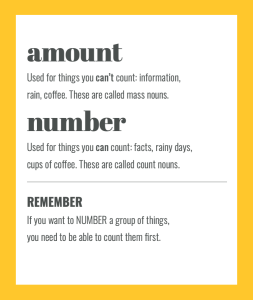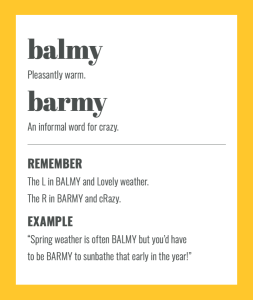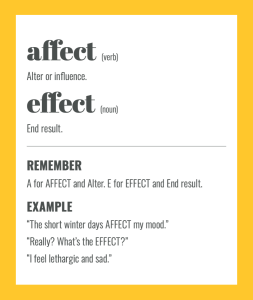Of course you could! Here goes:
Number vs amount: top tips to remember which is which
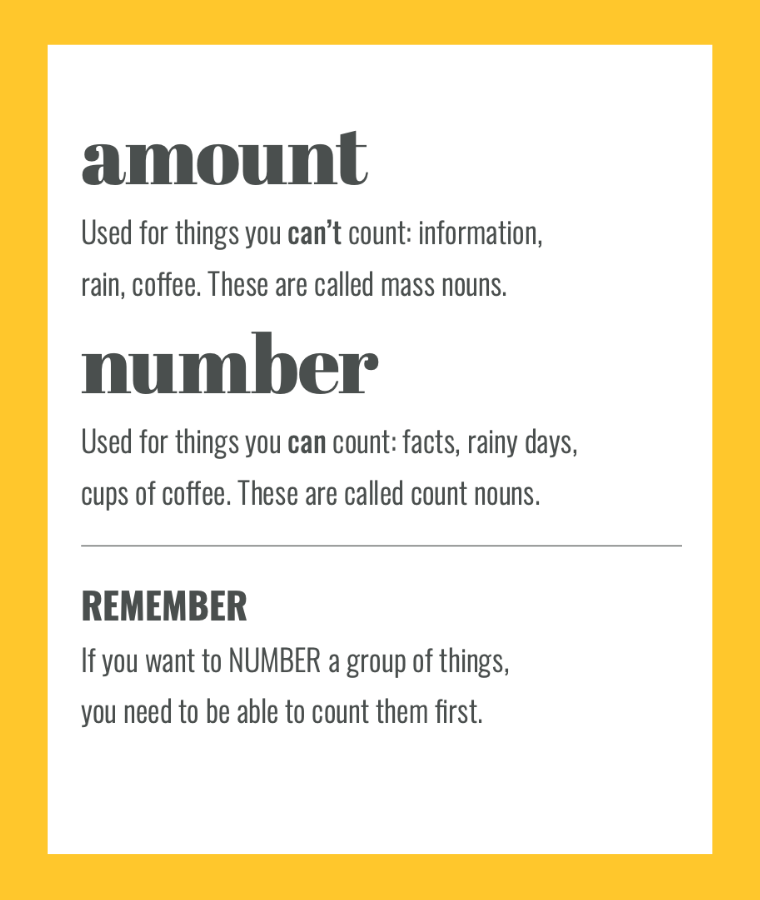
Number vs amount: this simple tip will help you remember the difference
To start with, it can help to know that things you can count are called count nouns, and things you can’t count are called mass nouns.
Use AMOUNT for things you can’t count (mass nouns):
- the amount of rain
- the amount of information
- the amount of coffee
Use NUMBER for things you can count (count nouns)
- the number of rainy days
- the number of facts
- the number of cups of coffee
Simple as that: if you can count it, use NUMBER. If you can’t, use AMOUNT.
Did you know?
The same rule applies for LESS and FEWER, which are equally commonly confused.
Bonus tip
Once you know this, you can apply the same logic to MANY and MUCH.
Use MANY for things you can count, and MUCH for things you can’t.
For example:
- Using too MANY words can confuse your message.
- Too MUCH confusion can prevent customers from buying your products.
Get more tips in The Little Book of Confusables
Specialist or generalist: which type of copywriter is right for your business?

A tweet from Alasdair Murray – who describes himself as ‘the recruitment copywriter’ – got me thinking.
Specialist copywriter vs generalist copywriter: which is best?
To niche or not to niche. It’s one of the biggest considerations for anyone getting started in copywriting – and equally important for any business choosing the right marketing copywriter to work with.
“Do I specialise in one area or industry?” asks the aspiring copywriter.
“Do I need a specialist in my industry?” asks the business owner.
In the 19 years that I’ve worked as a freelance copywriter, two questions crop up with predictable regularity: “How did you get started?” and “Do you specialise?”.
My answer to the latter is yes. I specialise in writing clever copy that helps businesses become more successful.
Cheating, right?
You were expecting me to say, “Yes. I specialise in travel/engineering/unicorn maintenance*” *delete as appropriate
To answer the first question… (stay tuned – it’s relevant)
I started my career in financial services marketing. I wrote shiny brochures for new investment products, leaflets about mortality and morbidity to help advisers sell more life assurance, and pension marketing messages about the cost of delay.
Did this early career choice make me want to specialise as a financial services copywriter?
Did it heck.
Don’t get me wrong. I loved my job. Really. Bloody. Loved it.
Nothing to do with swanky lunches in Canary Wharf with Ogilvy & Mather (as they were back then) or the glamour *cough* of art directing photo shoots for those investment brochures.
(Okay, maybe a smidge. I mourn those days. Today’s corporate entertaining is a one-shot skinny latté at my gym.)
That job was just about the best start I could have had to my copywriting career. In my opinion, real-world, earn-your-stripes commercial experience backed up by on-the-job training beats the pants off academic study – but each to their own.
To the matter in hand…
If you’re an aspiring freelance copywriter…
(Business owner looking to hire the right copywriter? You can skip this bit.)
There’s no right or wrong answer to the question of whether or not you should specialise.
If you’ve spent your career working in a particular industry and you still enjoy it, you may well want to stay there.
It’s where you’ve made connections, where you’ve built up your experience, and where you really know your stuff.
For you, writing about your specialism is second nature. You know it all already.
Decision made.
But wait…
For me, the best thing about working across a wide range of industries is the variety.
No two jobs are the same.
I don’t spend my days trying to come up with ingenious new ways to sell the same product or service.
Every project is a fresh opportunity to understand a new market’s challenges, audience and opportunities. Every job is as exciting and different as the last. It’s often a steep learning curve, but my god it’s rewarding.
Nineteen years into my freelance career and I love this job even more than when I started.
Would I be saying that if I’d specialised? I don’t know.
If you’re struggling to decide, trust your gut instinct and try not to overthink it.
What’s the worst that can happen? You set yourself up as a specialist cupcake copywriter, or the authority on orthopaedics and it doesn’t work? Onwards and upwards.
Don’t wait to perfect your idea – start from where you are, and give it your best shot. You can always revisit and refine later. (That’s a whole other blog post…)
Let me know how you get on.
If you’re a business owner choosing a copywriter…
One of the best things about working with someone who doesn’t specialise in your industry is that they don’t specialise in your industry.
Sorry?
It’s simple. Writing copy that sells involves understanding what makes your business special, and what makes your customers tick.
A specialist already knows this. They’ve written this stuff many times – heck, they may even work for your biggest competitor.
A non-specialist makes no assumptions. They see things with fresh eyes and the same curiosity your potential customer has when they first stumble across your business.
They ask the right questions to find out how your business works, the problems you solve for your customers, and what makes your product or service better than the competition.
I may not be familiar with your industry. I may not have written a website for one of your competitors. But you bet your life that what I write for you will be fresh, and relevant, and incisive.
And at the end of the day, isn’t that what all businesses want?
__
In the interests of fairness and balance, here’s the view from the other side of the fence, written by the aforementioned recruitment copywriter, Alasdair Murray.
Brake vs break: do you know the difference?
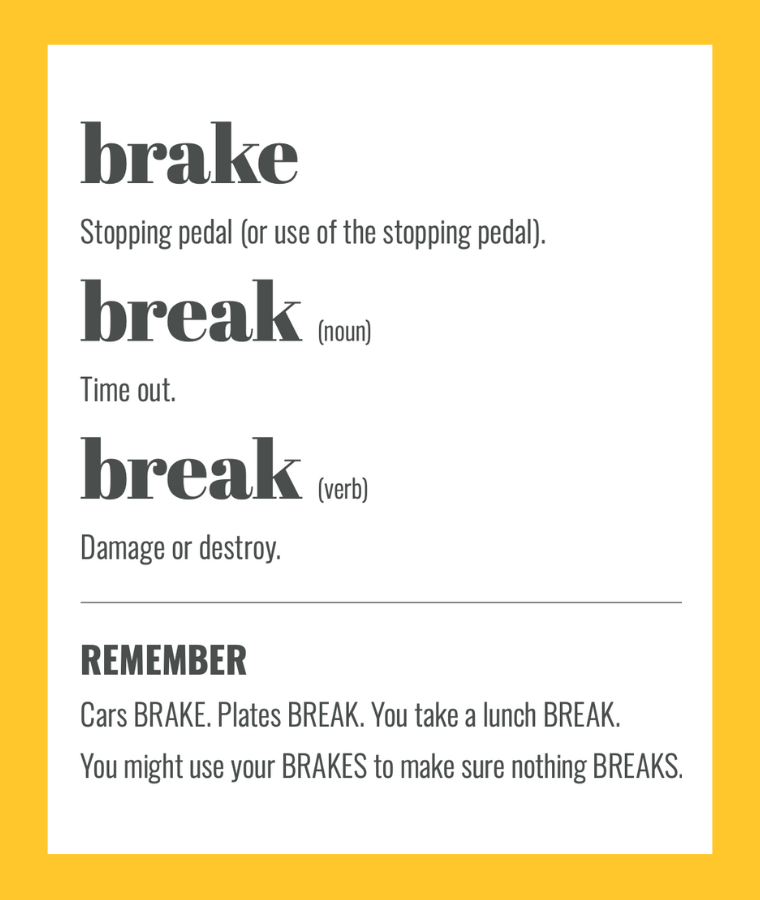
BRAKE vs BREAK: which is which? Tips and tricks to remember the difference
BRAKE and BREAK are easy to confuse – especially if you’re new to the English language. The fact that the two words sound the same – they’re homophones – means people commonly mix them up.
Here are my simple spelling tips to remember the difference between BRAKE and BREAK.
When to use BREAK
BREAK can be both a noun and a verb.
As a noun, BREAK means time out.
“It’s time for your lunch BREAK”
“Let’s take a BREAK”
As a verb, BREAK means damage or destroy.
“I dropped my phone but luckily it didn’t BREAK.”
When to use BRAKE
BRAKE can be both a noun and a verb.
As a noun, a BRAKE is the stopping pedal in a car or other vehicle.
As a verb, BRAKE means to slow down or stop – for example, a car.
Noun: “Remember to use the BRAKE to stop the car in good time.”
Verb: “I had to BRAKE hard to avoid the oncoming cyclist.”
Get more tips in The Little Book of Confusables
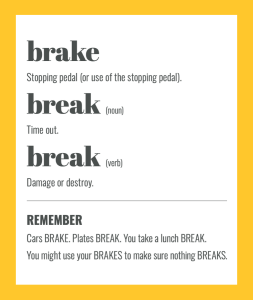
BREAK vs BRAKE. Excerpt from The Little Book of Confusables by Sarah Townsend.
Balmy vs barmy: simple tips to remember the difference
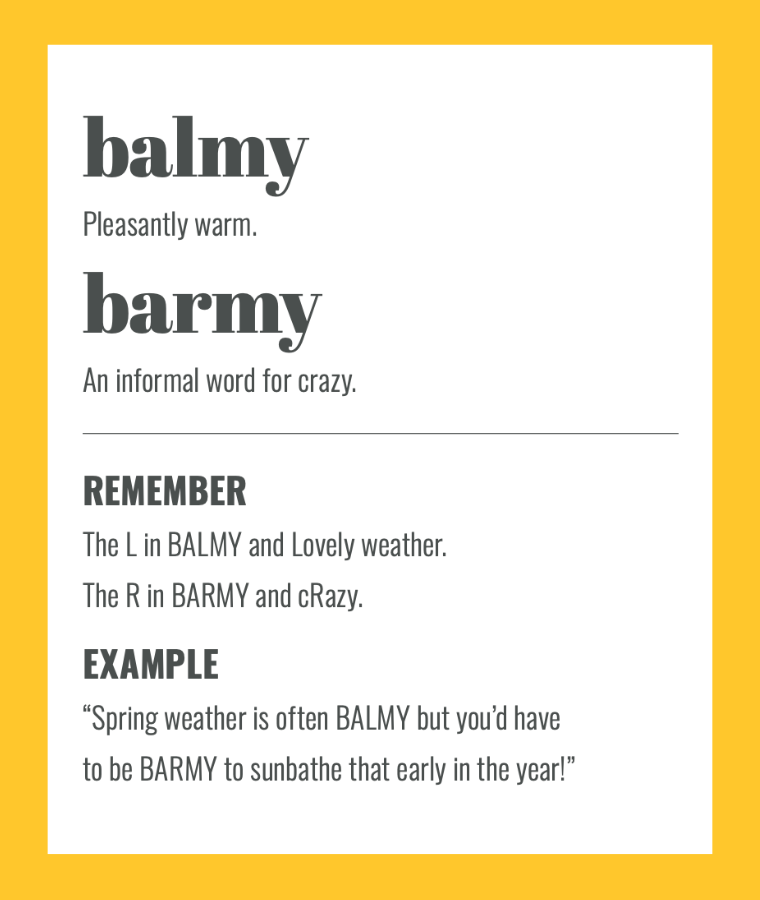
BALMY vs BARMY: which is which? Top tips to remember the difference.
BALMY and BARMY – these soundalike words (also known as homophones) are easy to confuse.
And there’s a big difference between a BALMY (warm) summer’s day and a BARMY (crazy) summer’s day!
Here are my simple spelling tips to remember the difference between BALMY and BARMY.
BALMY is an adjective (a describing word) that means pleasantly warm. If you’re tempted to confuse it with BARMY remember L for lovely weather.
“It’s a beautiful BALMY summer day.”
BARMY is a colloquial or informal expression for mad or crazy.
“It’s all too much – I’ve finally gone BARMY!”
Get more tips in The Little Book of Confusables
Effect or affect: do you know the difference?
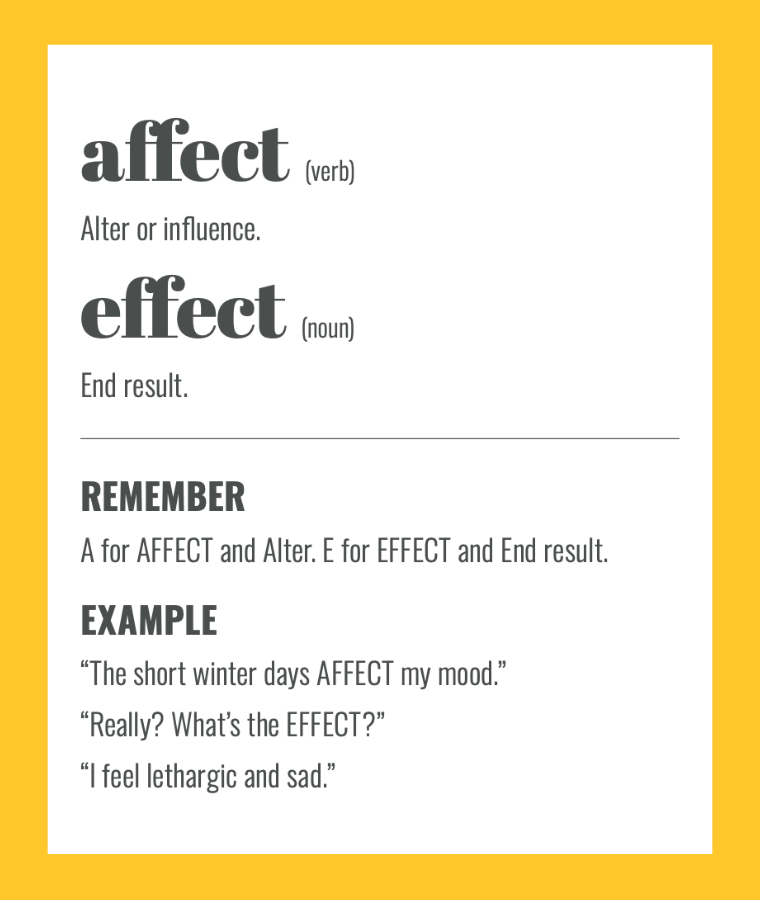
Simple tips to remember the difference between EFFECT and AFFECT
EFFECT and AFFECT are easy to confuse and often spelled wrong.
The fact that the two words sound the same – they’re homophones – means people commonly mix them up.
Here are my simple tips to remember the difference between EFFECT and AFFECT.
AFFECT is a verb that means alter or influence. Think A for alter.
“The rain AFFECTS my hair.”
EFFECT is most commonly a noun meaning the result of something. Think E for end result.
“The EFFECT of the rain is wet hair.”
Advanced lesson
That cheeky little ‘most commonly’ above? EFFECT can also, rarely be used as a verb, to mean ‘bring something about’.
“The voting was rigged to EFFECT the victory.”
EFFECT as a verb is rarely written outside of formal English, so you’re fairly safe to assume you won’t need this spelling.


